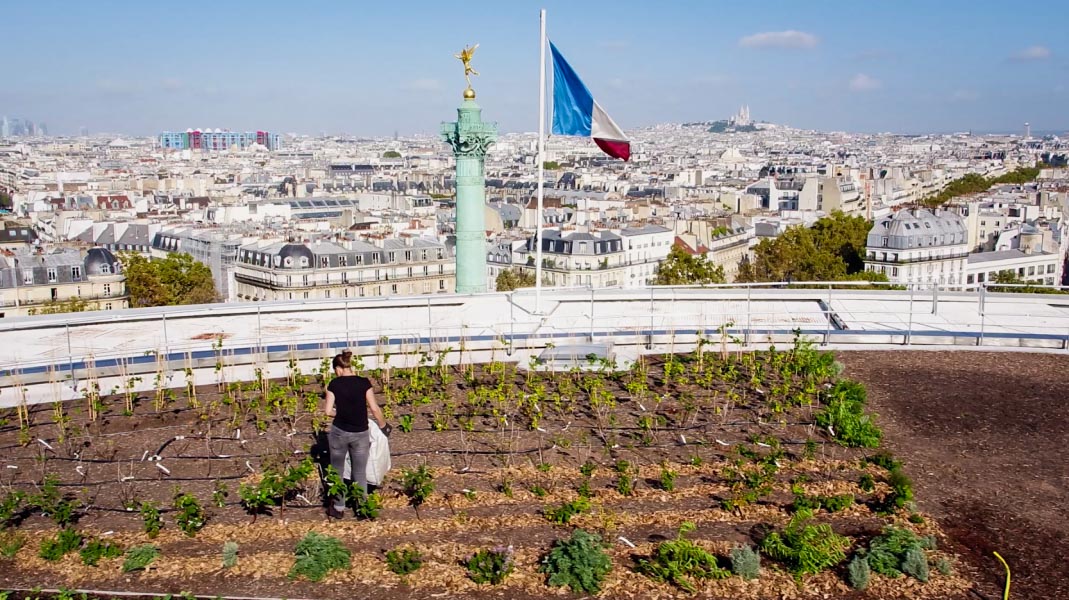The French capital’s ambitious vision for urban agriculture is in full bloom. We take a look at the city’s signature Parisculteurs programme to understand why its unique approach is receiving world-wide attention.
From ‘the city of light’ to the ‘the city of love’, Paris is known by many names. These days, however, it is coveting a new identity – as Europe’s hub for urban agriculture.
At the heart of such a pivot is the Parisculteurs programme, a leading initiative “to facilitate and accelerate the installation of agricultural projects” by unlocking previously unused or underutilised sites for agricultural projects.
Established in 2016, the programme has seen the city partner with more than 30 companies, public entities, and Parisian property owners, as well as 15 local authorities to identify suitable agricultural sites across the city.
The sites are then put out to public tender for would-be urban farmers to submit their ideas.
Since the programme’s launch, 100 projects across 30 hectares have been approved; 78 have already been installed, representing more than 21 hectares of active productive agricultural area across the wider metropolitan area.
The locations of the sites are as diverse as the nature of the projects themselves.
Current initiatives include a mushroom farming start-up in an underground carpark; a microgreens greenhouse located on a non-drinking water reservoir in the centre of the city, which doubles as an education centre for budding urban farmers; and a network of school rooftop gardens designed to teach students about horticultural practices and healthy eating habits.
Géraldine Pleis, a former project manager for urban farming at the City of Paris, tells us that the benefits of increased urban agricultural activity are as much environmental as social and political.
“There are real benefits in terms of biodiversity developments, the creation of cool islands on rooftops and in other spaces, rainwater retention, awareness of sustainable food and seasonality, et cetera. Our urban agriculture produced foodstuffs are sold directly to Parisians.”
Since her election in 2014, the city’s mayor, Anne Hidalgo, has pursued a sweeping agenda to make Paris a greener city, with urban agriculture as its centrepiece.
But growing in the city has a long history in Paris. Between 1850 and 1900, it’s estimated that up to one-sixteenth (6 per cent) of all the land within the city limits was dedicated to urban agriculture, feeding Paris “all year round with the widest variety of both in-season and out-of-season fruits and vegetables”, according to author Eliot Coleman.
As the 20th century marched on, however, urban planning policies, as well as the development of transport infrastructure, began to relegate urban farming to the outskirts of the city, and with it the sense of connection Parisians had to their food.
A New Kind of Urban Agriculture
As the Paris of today looks very different to what it did at the end of the 19th century, returning agriculture to a modern metropolis brings with it some very modern challenges.
“The biggest constraints for the city and Parisculteurs are regulations around urban planning and accessibility,” says Géraldine.
Current project manager, Jacques-Olivier Bled, adds that each site must be approved based on certain standards and, when it’s a public building, the costs of doing this are covered by the City of Paris.
“We have lots of problems with load-bearing capacity, for example – the maximum weight that you can put on the roof.”
It’s also important to find good sites with sufficient sunlight and accessibility – whether the sites have stairs or elevators, for example. “There has to be the ability to welcome the public,” Géraldine adds, “because if there is a problem with accessibility, they can’t hold events and it’s very difficult for us to prove that there is a sound economic model for the project.”
Despite the difficulties, most Parisians are supportive of the programme, something she puts down to the city’s consultative approach.
“It’s very important for us to involve inhabitants at the beginning when the city and the owners present the project.
“Neighbourhood councils are always consulted during the jury deliberations that are organised for each site … to be sure that they’re going integrate the project and participate in the evaluation and communication of it.”
To Everything There is a Season
So, what can other cities learn from the Parisculteurs story?
Our CityChangers say that municipalities who are interested in replicating their success should know that a programme of this size and scope requires significant political capital.
Political support is necessary to carry out a programme of this type. And, Jacques-Olivier notes, that’s not all.
“Such a project requires financial resources, but it does not cost more than installing much more basic revegetation, which would not provide the same services to the city.”
The investment needed goes beyond finding the sites and installing them, as Géraldine explains.
“We also carry out annual monitoring of the sites that have been installed, and we try to collect a lot of data to better understand the different issues in the urban agriculture sector.”
For now, political support is not something the team needs to worry about. Anne Hidalgo was re-elected in 2020, and, after a second round of tenders announced in 2023, the work of Parisculteurs continues.
Géraldine says her team hopes to expand into new sites in the future, including “military barracks, private schools, ministry buildings” and even peri-urban sites. And, with so many successful projects already under way, conditions are looking good for another bumper crop.
Note: the interview with Géraldine Pleis took place while she was in post as project manager for urban farming at the City of Paris. For more information about the project, contact Jacques-Olivier Bled via the official Les Parisculteurs website or by email.

